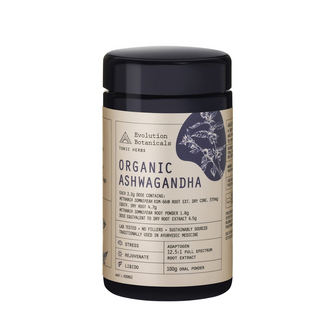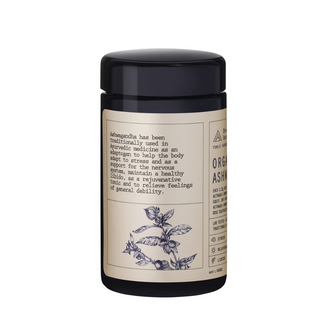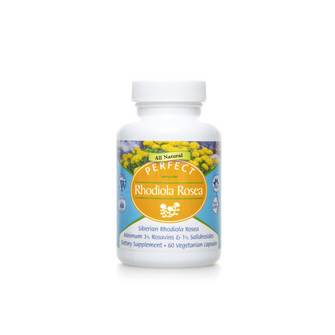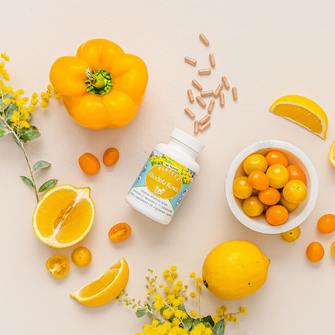Categories
What are Adrenals?
Adrenals are the adrenal glands that sit on top of your kidneys and they are orange in colour and triangular in shape. They produce many important hormones that all have their own specific role/s in the body and your health.

The way that the adrenal glands work is that they create hormones in response to the signals from the pituitary gland in the brain. The pituitary gland reacts to the signals received from the master gland - the hypothalamus.
The pituitary gland makes adrenocorticotrophic hormone that tells your adrenals to make the many different hormones needed for the various functions and then that particular area of the adrenals will secrete that particular hormone when called for.
Did you know that the adrenal glands are also known as 'suprarenal glands' they are composed of the adrenal cortex and the adrenal medulla.
The adrenal cortex is the outer region and the largest part of the gland which is divided into 3 different zones - Zona glomerulosa, zona fasciculata and zona reticularis.
Zona glomerulosa: secretes the mineralocorticoid hormone - aldosterone
Zona fasciculata: secretes the glucocorticoid hormone - cortisol
Zona reticularis: secretes androgen hormone - DHEA
The adrenal medulla is the inner layer and the smallest part of the adrenal glands. They are responsible for producing adrenaline and norepinephrine.
We will go through the different hormones with a brief explanation so you have a good idea of what they are, what they do and how important it is to look after these precious glands!
Like every organ or gland in your body, the health of your adrenals is paramount to good health as they produce many hormones (as mentioned), such as; adrenaline, aldosterone, cortisol, DHEA and norepinephrine.
The list of all the hormones that they produce could fill the pages of a book so we will just stick to the main 5 here for the purpose of today's article.
These hormones have various roles in the body; some are for promoting proper cardiovascular function, some help us in how we respond to stress, our mental health, some help us to properly utilise carbohydrates and fat and some are associated with body odour and others promote healthy gastrointestinal function and much ouch more!
Let's start with adrenaline...

Adrenaline
This hormone triggers 'fight or flight' (your sympathetic nervous system and basically, your body's built-in alarm system) and this is important when you are in danger as it helps you to escape or fight the offender.
What is very common these days (as we live in a much more stressful world), is for many people to be in a 'fight or flight' (adrenaline) state even when they are not in danger, like if perhaps you are in a supermarket and you have an anxiety attack because of the lighting or something like that, or you see someone you know and you really don't want to chat with them, your body may go into 'fight or flight' and release adrenaline into your body to prepare you for the supposed danger.
When you experience an adrenaline rush in a non-threatening situation, you may feel dizzy, lightheaded and you may even experience changes in your vision (I know I have definitely experienced this and it's not pleasant at all)! 🥺
I have been in this exact situation actually and my vision went blurry to the point that I couldn't even read a text message on my phone properly. It's amazing how powerful stress can be on your physiology - including your eye sight!
Mind you, this stress was probably not isolated, I was probably going through a very stressful period in my life and this was probably that straw that 'broke the camel's back' if you know what I mean?
Much of it psychological (how we think and believe), some of our reaction is biological and believe it or now, our gut health but I will go into this another time as it's quite in-depth.
Aldosterone
Aldosterone is a hormone produced in the cortex of the adrenals and this hormone plays a very important role in the regulation of our blood pressure (and we thought it was just the heart)?
Aldosterone speaks to the kidneys and colon (via natural chemical signals) to help regulate sodium and also the amount of potassium that is released into the urine. Both of these minerals are electrolytes and as you probably know, electrolytes in good balance are super important for proper functioning of nerves, heart rate, hydration, muscle contraction and regulating our body's pH levels.
The main electrolytes in our body are bicarbonate, calcium, chloride, magnesium, phosphate, potassium and sodium.
Without adequate electrolyte balance, things can malfunction and our wellbeing can suffer. We may experience fatigue, irregular heartbeat, numbness/tingling, confusion, muscle weakness and cramping, headaches and more seriously, convulsions!
I remember many years ago when my husband Jason was cycling competitively, he ended up in hospital with severe electrolyte imbalance due to not replenishing properly (severe depletion) whilst racing in the hot summer weather. 🥵
I digress...
Back to aldosterone, basically it is vital for healthy kidneys and kidney function and if you are having blood pressure issues, it may be wise to discuss having your hormones tested? Aldosterone and any other relevant hormones that your doctor believes may be important to test for.

Cortisol
We hear lots of chitter chatter about cortisol these days - it's kind of a buzz word but there is much misunderstanding around the role of cortisol and it's even got the reputation of being "bad".
Of course, it can have negative effects in some instances and we will get to that but when it is in balance it actually is vital and you would not be here without it!
You may also need cortisol to:
- Make memories in our brain
- Get you going in the morning
- Manage inflammation
- Support your metabolism
- Help to manage salt and water retention levels
- Help with blood sugar modulation
- Develop a fetus in a pregnant woman
Often referred to as the "stress hormone" because of how its connected to the stress response but what you may not know is that cortisol is vital to keep your other hormones balanced!
It is also what helps to wake you up in the morning and give you energy for your day. It is only bad if you are over-producing it (just like adrenaline) and are in a constant state of 'fight or flight".

Cortisol is a steroid hormone and most of the cells in our body have cortisol receptors.
Its secretion is controlled by the hypothalamus but as you know, it is produced in the adrenal glands. This glandular synergy is often referred to as the 'HPA Axis' (hypothalamic-pituitary-adrenal axis).
Low cortisol is also a problem and can cause a condition known as Addison's disease. This is said to be an autoimmune disease.
When we manage our stress and the way we respond to stressful situations, people or events, we can keep on top of cortisol and keep it more balanced. For this reason (and others), I personally do many things daily to help keep my cortisol balanced, such as:
- Get into nature (no phone preferably)
- Walk my dogs (again, no phone or devices is better)
- Meditate
- Watch the sunrise or sunset
- Do breath work
- Have a rest
- Read a good book, article or magazine
- Listen to an educational podcast or audiobook
- Cook
- Write
- Clean the house (this can be very therapeutic)
- Make my bed (again, this can be wonderful for reducing stress)
- Be organised
- Diffuse calming/uplifting essential oils
- Hug someone
- Listen to good music (classical, piano etc is very calming)
- Ensure I am getting enough magnesium.
DHEA
This stands for dehydroepiandrosterone and this hormone is produced in the adrenals but controlled by the brain. DHEA is known to help with energy, muscle strength, boosting immunity, our weight/body composition, ageing but also things like the prevention of atherosclerosis, sexual function, mitochondrial function and endothelial function.
Commonly known as a 'pro hormone' that the body converts to testosterone and oestrogen. It has been shown to have other health-promoting effects (non-hormonal) some of which we mentioned already.
As we age (like with many things), DHEA levels can decrease.

Norepinephrine
Also known as noradrenaline, norepinephrine is also a neurotransmitter.
This hormone/neurotransmitter plays a role in your mood and concentration and like some of the other hormones mentioned, norepinephrine also helps your body respond to stress but also exercise.
The other hormones that help your body respond to stress and exercise are:
- Adrenaline
- Cortisol
- Corticotropin releasing hormone
- Adrenocortical hormone
Norepinephrine also helps to increase the heart rate (along with adrenaline) and also blood pressure.
Norepinephrine also does the following:
- Helps to break down fat
- Increases blood sugar levels for more energy
- Plays a role in the sleep-wake cycle
- Helps you wake up in the morning (as well as cortisol)
- Increases your attention to help you perform
- Helps you with memory storage
- It's vital for your emotions (low norepinephrine levels are strongly linked to depression*, anxiety, ADHD, PTSD and substance abuse)
*Certain anti-depressants can affect the level of norepinephrine in your brain and that's possibly why they don't work for some or make others worse)?

The following activities activities naturally increase norepinephrine:
- Exercising
- Cold thermogenesis or exposure to cold temperatures
- Fasting
- Sleeping
- Meditating
- Accomplishment
- Music
- Increase the amino acids tyrosine and phenylalanine (hydrolyzed collagen contains these and many more essential amino acids)
Adrenal Fatigue
Also known as "adrenal exhaustion", this term is not commonly accepted by mainstream medicine but in my humble opinion, it should be. It's like many things that modern medicine doesn't wish to recognise (because many of these things aren't treated by drugs but rather diet and nutrition and sometimes through herbal medicine).
It's like how chronic fatigue was not medically recognised for the longest time by allopathic medicine but now is and how pyrrole disorder still isn;' but soon will be...
When you are "adrenally fatigued", this means that your adrenal glands are depleted (often through chronic stress and overdoing life) and you can experience many unpleasant effects to your wellbeing - such as:
- Poor response to stress (this can also be your gut)
- Brain fog and other cognitive issues
- More energy in the evening (when you should be winding down)
- Cravings for salty/sweet foods
- Caffeine abuse or overusing other stimulants to get through the day
- A compromised immune system
- Energy crashes throughout the day - especially in the afternoon

In some instances, other symptoms may be experienced such as:
- Insomnia/sleep issues
- The need to keep urinating (polyuria)
- Loss of muscle tone
- Inadequate circulation
- Depression
- Weight gain
- Low libido
The Role Cholesterol Plays in Adrenal Health
Cholesterol is not a villain as modern medicine has led us to believe, in fact, cholesterol is a vital substance in our body and for healthy adrenal function.
Some recent information has come to my attention whilst reading last night and I had to add this in here as it is a key element of adrenal health and to leave it out only gives you half the equation and that doesn't serve anyone.
This information is about how cholesterol is needed for healthy adrenals but also to help a person to heal and recover from adrenal exhaustion/adrenal fatigue.
Dr Natasha Campbell-McBride (neuroscientist, nutritionist, speaker and author) wrote a book called 'Put Your Heart in Your Mouth' and in the book there is a chapter on cholesterol (which we have been talking about for some time now also).
On page 29 of the book, Dr Natasha speaks about the vital role that cholesterol plays in our sex hormones and because most sex hormones are produced in the adrenal glands, and because we live very stressful lives in an uncertain world, this constant stress chews up these stress hormones and over time, this can lead to adrenal exhaustion.
Every single cell in the human body contains cholesterol and your adrenal glands require this vital molecule also, so if we aren't eating enough cholesterol-rich foods such as pastured eggs, cod liver oil and butter/ghee, we may need to start consuming more of these foods.
The theory of cholesterol being harmful has been debunked many times and is poor science. There have been countless books written about it and many doctors are now speaking out. If you would like to learn more about this topic, please check out our blog 'Why Cholesterol is Important for Your Health'.
In Closing
If you feel like you may have issues with your adrenals, it is always best to speak to your trusted health practitioner. There are many things you can do to heal naturally and get back on track. Choose one or many things from my list of cortisol-reducing activities or perhaps you have your own calming ways. There is no right or wrong as long as you are living in a more calm state for most of your waking hours.
Taking certain herbs such as ashwagandha and schisandra and also rhodiola have all been said to help support adrenal health so something to consider?
Another thing that you can do to support your adrenal and overall health daily is to have an adrenal cocktail first thing in the morning. If you have adrenal issues, coffee is not the best way to go as it stimulates the production of stress hormones.
As someone who has been on and off coffee for years I can honestly say that my adrenals, nervous system and gut health are all much better without coffee but I also get that it's a personal journey and you have to be ready to give it up or at least drastically reduce your intake.
Like all the organs in our body, we must really take good care and reducing stress is one of the biggest factors at play when it comes to our adrenals.
Check out our Adrenal Cocktail recipe here. We think it outshines all the others on the internet and we hope you get to try it.
Love to Learn More about Adrenal Health?
Check out more of our adrenal blogs:
- Adrenal Fatigue Is Real!
- Adrenal Cocktail Recipe for Optimal Health
- How I healed from Adrenal Fatigue
- Supplements for Adrenal Support and Healing
- Exercises for Adrenal Fatigue
- Activities to Avoid When You Have Adrenal Fatigue
References:
https://www.endocrine.org/patient-engagement/endocrine-library/hormones-and-endocrine-function/adrenal-hormones
https://www.endocrineweb.com/cortisol-good-bad
https://www.livescience.com/65446-sympathetic-nervous-system.html
https://www.healthline.com/nutrition/electrolytes
https://www.drlamcoaching.com/blog/frequent-urination-and-symptoms-of-adrenal-fatigue/
https://www.endocrineweb.com/conditions/adrenal-disorders/adrenal-fatigue
https://www.simplypsychology.org/hypothalamic%E2%80%93pituitary%E2%80%93adrenal-axis.html
https://www.agelessforever.net/anti-aging-news-blog/dhea-does-it-have-any-beneficial-non-hormonal-effects
https://drvanta.com/ways-increase-norepinephrine/
'Put Your Heart in Your Mouth', 2016 page 29. Written by Dr Natasha Campbell-McBride MD, MMedSci (neurology), MMedSci (nutrition)
Disclaimer: These are only potential benefits. This article is purely intended for informational purposes and not as advice. One must seek proper professional advice from their trusted health practitioner.








